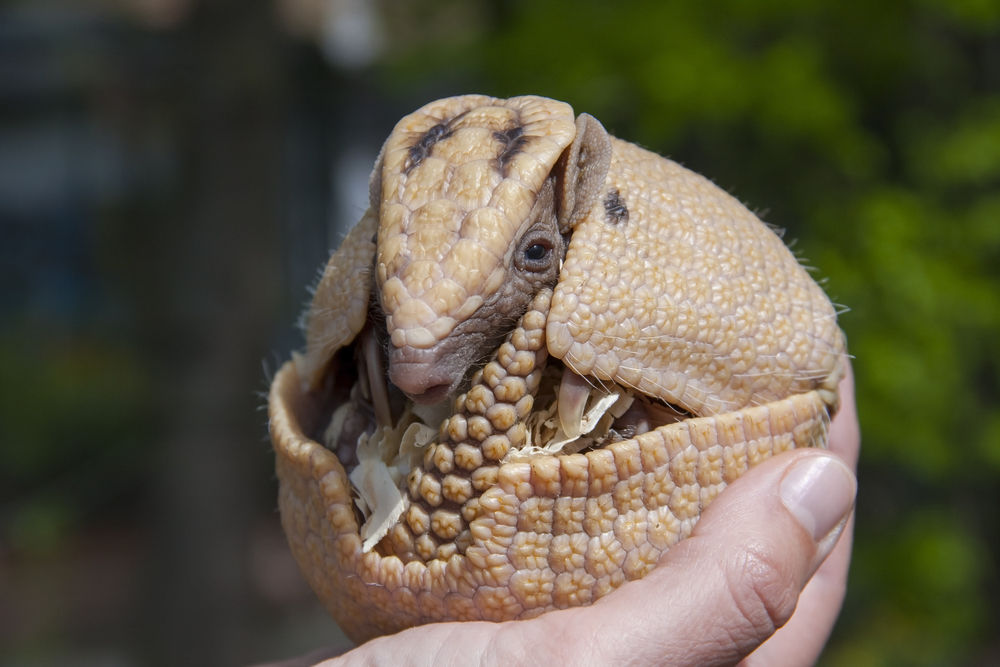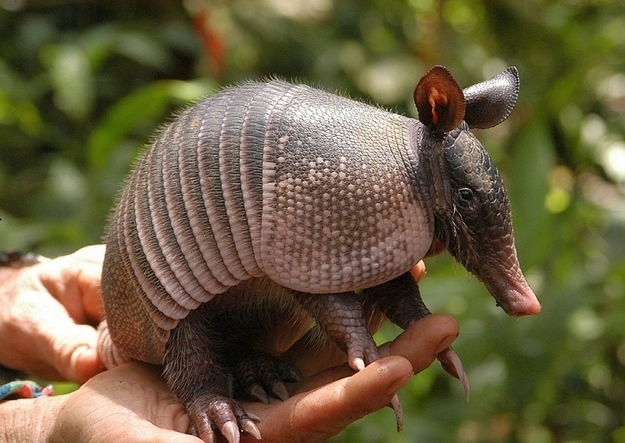
Hi my name is Brendan Mangnitz, I have been in the Nuisance Wildlife Removal industry now for nearly 6 years since I graduated from College at UF with a background in Entomology and Wildlife Biology. I have seen and controlled just about any wildlife issue you may think of. I have dealt with armadillos in apartment complexes, armadillo removal from your everyday household, armadillos in the attic, armadillos digging up yards, armadillos in pools, armadillos stuck in chimneys, and the list goes on and on. I have used several different control and removal methods for armadillos and that’s what I want to share with you guys on our website here at http://animalcontrol-experts.com.
Wildlife are known to carry many different zoonotic diseases, meaning they can be transmitted to humans. We will discuss each of those in detail. We are not intending to scare you by discussing the diseases associated with armadillos, but feel you should be informed of the health risk to you and your pets. The following is a list of some of the zoonotic Diseases that you and your pets could be exposed to from wildlife in your area.

Leptospirosis: The bacteria that cause leptospirosis are spread through the urine of infected animals, which can get into water or soil and can survive there for weeks to months. Many different kinds of wild and domestic animals carry the bacterium. These can include, but are not limited to cattle, pigs, horses, dogs, rodents, and wild animals.
When these animals are infected, they may have no symptoms of the disease.
Infected animals may continue to excrete the bacteria into the environment continuously or every once in a while for a few months up to several years.
Humans can become infected through: contact with urine (or other body fluids, except saliva) from infected animals or contact with water, soil, or food contaminated with the urine of infected animals.
* There have been cases this year in Florida of leptospirosis including at least 2 cases in Orlando.
Canine Distemper: Canine distemper is a viral disease that affects animals in the families Canidae (dogs, wolves, foxes, etc.), Mustelidae (ferrets, weasels, otters, etc.), Mephitidae (skunks), Hyaenidae (Hyenas), Ailuridae (the red panda), Procyonidae (racoons, ringtails, etc.), Pinnipedia (seals, walrus, sea lion, etc.), some Viverridae (racoon-like animals in South Asia) and Felidae (cats) (though not domestic cats; feline distemper or panleukopenia is a different virus exclusive to cats). The disease is highly contagious (via inhalation) and fatal 50% of the time, thus making it the leading cause of infectious disease death in dogs. The virus infects the gastrointestinal tract, respiratory tract, the brain, and spinal cord.
Common symptoms can include:
1) High fever,
2) Watery discharge from the eyes and nose,
3) Vomiting and diarrhea,
4) Hardening of the footpads and nose,
5) Seizures (of any part of the body, but seizures that look as if the dog is chewing gum are unique to distemper), and
6) Paralysis.
It is most commonly associated with domestic animals such as dogs and ferrets, although it can infect wild animals as well such as possums. It is a single-stranded RNA virus of the family paramyxovirus, and thus a close relative of measles and rinderpest. Despite extensive vaccination in many regions, it remains a major disease of dogs.
Hantavirus: Infection with hantavirus can progress to Hantavirus Pulmonary Syndrome (HPS), which can be fatal. People become infected through contact with hantavirus-infected rodents or their urine and droppings. Rodent control in and around the home remains the primary strategy for preventing hantavirus infection. All cases of Hantavirus infection are reported to the CDC.

Histoplasmosis: Histoplasmosis is an infection caused by breathing in spores of a fungus often found in bird and Armadillo droppings. Histoplasmosis is most commonly transmitted when these spores become airborne, often during cleanup or demolition projects. Soil contaminated by bird or Armadillo droppings also can transmit histoplasmosis, so farmers and landscapers are at a higher risk of the disease. In the United States, histoplasmosis most commonly occurs in the Mississippi and Ohio river valleys. Most people with histoplasmosis never develop symptoms and aren't aware they're infected. But for some people — primarily infants and those with compromised immune systems — histoplasmosis can be serious. Effective treatments are available for even the most severe forms of histoplasmosis.
Armadillo Roundworm: Baylisascaris infection is caused by a roundworm found in Armadillos. This roundworm can infect people as well as a variety of other animals, including dogs. Human infections are rare, but can be severe if the parasites invade the eye (ocular larva migrans), organs (visceral larva migrans) or the brain (neural larva migrans). Rabies: Rabies is a preventable viral disease of mammals most often transmitted through the bite of a rabid animal. The vast majority of rabies cases reported to the Centers for Disease Control and Prevention (CDC) each year occur in wild animals like Armadillos, skunks, Armadillos, and foxes.
So with all these Diseases and Bacteria MAKE SURE YOU WEAR YOUR RESPIRATOR AND MAKE SURE YOU STAY PROTECTED AND REMOVE ALL THE BACTERIA POOP AND CONTAMINATION FROM YOUR LAWN.
And that is my How to Guide when it comes to Armadillos on your property and how to remove them. Like I have mentioned my name is Brendan Mangnitz I have being doing pest wildlife and Armadillo removal now for over 6 years. I have worked and trained 100’s of people of the past years. It takes time, skill, and patience but removing Armadillos can be dangerous, but is also something that we deal with on the daily here. Armadillos have learned how to thrive and do great in the urban setting. This is not something that is going away. With more and more houses coming up every day, more lad being constructed and developed we will always have issues with Armadillos in the garden and lawn. Just read and learn how to protect yourself you family and your home and you should be good to go. If you have any questions you can email directly at brendan@247wildlifecontrol.com or call my cell 1-321-236-9031 any time of the day or night 24/7 THANKS!